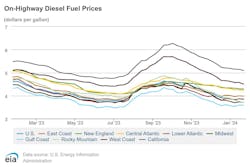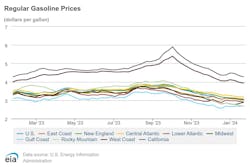After a few weeks of price decreases, a week of plateaued prices, and a slight increase in prices the following week, the cost of diesel fuel decreased slightly through the third week of the year. National diesel fuel averages fell by roughly three cents with the average national cost of a gallon of diesel fuel now $3.838, according to the U.S. Energy Information Administration.
Last week’s increase pointed to inclement weather affecting most of the U.S., with frigid temperatures nationwide. With those weather events in the past, fuel prices have dropped back into their plateau of the previous week.
See also: Diesel prices begin to creep up amid arctic front
Diesel fuel prices fell in every region. In the East Coast region, prices dropped roughly one cent, with an average price of $3.979 from $3.992. In the Midwest, diesel prices dropped about three cents from $3.729 last week to $3.704 this week. The Rocky Mountain region saw a nearly six-cent decrease, with diesel prices decreasing from $3.755 to $3.696. The Gulf Coast region saw the slightest change, reducing from $3.592 to $3.584. The West Coast saw the most significant decline, with the week’s average price at $4.504 from $4.576 the week before. This includes California, which alone saw an average decrease of a nickel.
Like the EIA, the AAA Motor Club noted a decrease in the national average diesel price. The club recorded the week’s average price at $3.905 compared with the price of a gallon a week before at $3.917. According to AAA data, these prices are well below this time last year, which saw an average price per gallon of diesel fuel at $4.622.
Gas prices rise in two regions, increasing national average
“If June and July are when we typically see the highest gas prices, then December and January are when we see the lows. And this pattern is holding firm,” said Andrew Gross, AAA Motor Club spokesperson, in a statement last week. “The national average for gas will probably maintain this slow shuffle higher for the next week or two.”
However, according to EIA data, that statement aged well for only two regions.
The EIA recorded an increase in the national average, though the only regions with increased gasoline prices were the Midwest and the Gulf Coast regions. The Midwest saw an increase of nearly seven cents, going from $2.823 to $2.889 per gallon. In the Gulf Coast, a gallon of gas costs an average of $2.685 compared to the week before at $2.670. The region with the largest decrease in gasoline prices was the Rocky Mountain region, with a reduction of just over six cents from $2.733 to $2.671.
Gasoline prices from AAA were slightly different but consistent with an average increase. The club recorded an average price of gasoline per gallon at $3.077 for the week compared to the week before at $3.068.
Gas prices are the least expensive in Oklahoma at $2.563 per gallon and the most expensive in California at $4.506 per gallon, according to AAA data.
About the Author
Jade Brasher
Senior Editor Jade Brasher has covered vocational trucking and fleets since 2018. A graduate of The University of Alabama with a degree in journalism, Jade enjoys telling stories about the people behind the wheel and the intricate processes of the ever-evolving trucking industry.



